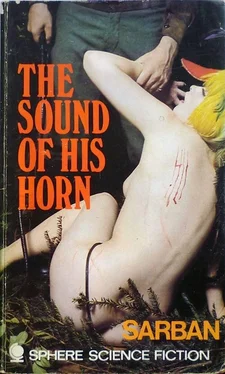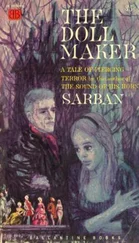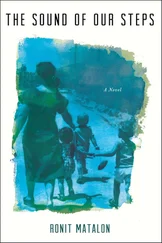Сарбан - The Sound of His Horn
Здесь есть возможность читать онлайн «Сарбан - The Sound of His Horn» весь текст электронной книги совершенно бесплатно (целиком полную версию без сокращений). В некоторых случаях можно слушать аудио, скачать через торрент в формате fb2 и присутствует краткое содержание. Жанр: Альтернативная история, на английском языке. Описание произведения, (предисловие) а так же отзывы посетителей доступны на портале библиотеки ЛибКат.
- Название:The Sound of His Horn
- Автор:
- Жанр:
- Год:неизвестен
- ISBN:нет данных
- Рейтинг книги:4 / 5. Голосов: 1
-
Избранное:Добавить в избранное
- Отзывы:
-
Ваша оценка:
- 80
- 1
- 2
- 3
- 4
- 5
The Sound of His Horn: краткое содержание, описание и аннотация
Предлагаем к чтению аннотацию, описание, краткое содержание или предисловие (зависит от того, что написал сам автор книги «The Sound of His Horn»). Если вы не нашли необходимую информацию о книге — напишите в комментариях, мы постараемся отыскать её.
The Sound of His Horn — читать онлайн бесплатно полную книгу (весь текст) целиком
Ниже представлен текст книги, разбитый по страницам. Система сохранения места последней прочитанной страницы, позволяет с удобством читать онлайн бесплатно книгу «The Sound of His Horn», без необходимости каждый раз заново искать на чём Вы остановились. Поставьте закладку, и сможете в любой момент перейти на страницу, на которой закончили чтение.
Интервал:
Закладка:
6
Von Eichbrunn was as good as his word. I was roused very early the morning after next, and before I had finished putting on the suit of forest clothes he had sent in to me I heard him calling me from the verandah. It was a fine fresh morning; the scent of the forest was intoxicatingly strong and sweet. I had heard no horns in the night; my sleep had been unbroken and dreamless; now the loud bird-song, the awakening quiver of the woods, the strengthening light on leaves and boles and grassy glades, exhilarated me.
The Doctor was dressed for the forest in a pair of close-fitting dark green trousers with broad gold braid, half-boots of suede-like material, and a jerkin that looked like a doe-skin richly frogged and ornamented with gold. He had a green velvet cap sporting a heron's feather on his head and swinging from a belt a long dirk or hunting sword with an ivory hilt. The suit he had lent me was after the same style, but plain.
He led me along one of the little paths winding away from the hospital, and I noticed he had caused two of the Slav serfs to follow us.
We had not gone more than a quarter of a mile when we came in sight of the first buildings of the Schloss. It is difficult for me to describe the place because I never had a general a view of it. In fact, it would be impossible to see it as a whole, for the forest grew not only close up to it but within its courts and alleys and arched over it in places like a tent. It was far from being a castle, as I had imagined it. The buildings were all low, half-timbered or built entirely of wood, exceedingly irregular in design, as if the architects had been obliged not to fell a single tree, but to make their plans conform to the shape and site of all the existing glades and open spaces in the area. In some places, indeed, enormous beeches or oaks were actually knitted into the fabric of the buildings, and there were turrets and little chambers contrived like nests among their spreading boughs.
There was something curiously secret about the place in this still and early morning. It was not simply that there was no one about: I had been prepared for that. I think it was that the austere, bright smartness of the hospital had led me to expect something of the same style in the Schloss, and instead I found a mediaeval waywardness, a fantastic crabbedness and contortion. These low, rambling buildings with their gables and dormers, their overhangs and nooks, odd windows and recessed doorways, seemed to have writhed in and out of the forest trees of their own accord, to have sought the shade and privacy of the groves like woodland beasts. They were forest dwellings through and through, their beams and boards, their lime and plaster, their grey foundation-stones and doorsills, were native to the earth about them. They were as sylvan as an Iroquois teepee or backwoodsman's cabin; and yet they were not rude. There was a kind of sly art in their construction; their baffling irregularity, their flight, as it were, from expected proportions and planes, had yet a Gothic cunning and mastery in it. We penetrated into a maze of courts and narrow walks, moss-grown and cobbled, tip-toed through pannelled passages and oaken galleries, and the fancy grew on me that we were stealing through a deserted and lost little German town of the Middle Ages which the forest had overgrown while time, by a miracle, had allowed it to defy ruin.
Von Eichbrunn spoke little and in a low voice, answering few of my questions, dropping only the briefest word of explanation as he showed me dwellings and dormitories, kitchens, kennels and stables. I would have liked to linger and look at the hounds and horses, at the carriages in the coach-houses and at the racks of old hunting arms and gear in some of the galleries, but he hurried me on, nervously anxious, I thought, to be out in the open, or the comparative open, of the forest again. So, I could see only that the Master Forester of the Reich appeared to keep a variety of hounds: one pack of stag-hounds of the black and white French St Hubert breed; some bloodhounds and some great creatures like boar-hounds, short-haired, brindled, tremendously strong and ferocious as tigers, which hurled themselves with savage snarling at the bars of their kennels as we passed. I have never seen such villainy, such determination to attack, even in the police dogs that our prison-camp guards kept. The Doctor glided by, as far from their fangs and their pale, glaring eyes as he could get.
The fury we had drawn on ourselves seemed to unnerve the Doctor so much that he forgot his way. We had come out, beyond the boar-hounds' kennel, into a little court, dimmed by the foliage of overhanging trees, out of which ran several dark little passages. Von Eichbrunn turned about, hesitating which one to take, then glanced back and made a questioning sign to one of the serfs who had followed us. Before the man could respond, a clear voice called challengingly from one of the passages. Von Eichbrunn started, then, with an unconvincing smile, dived into the passage, pulling me with him. He turned almost immediately through a doorway into a long, light room, of which one window gave on to the court we had left, while others, high up, looked to the blue sky through gaps in the tree-tops.
I saw that it was a young man who had challenged us; a youth dressed much as the Doctor was dressed, except that he had laid aside his jerkin and was in his shirtsleeves. Observing him from behind the Doctor, I thought him almost too perfect a specimen of what we used to consider the typical young Nazi to be true: not heavily built, but with a suggestion of the bruiser in his figure and pose; hair and lashes so fair he would have passed for albino but for his grey eyes; a face which, in the moment of haughty enquiry before he recognised von Eichbrunn, was a mask of exaggerated arrogance and cold authority, but which, when he briefly returned the Doctor's greeting, looked only selfish and sneering, with a suggestion of careless brutality about the eyes and mouth.
They spoke in German, the Doctor evidently explaining something about me. I felt the young man's eyes on me and carefully avoided them, looking round the room instead.
It appeared to be a keeper's or huntsman's room, stored with a strange variety of equipment, all having the air of being in use, well-kept, neatly arranged and ready to hand. Even the boar-spears standing in their racks by the wall were bright and serviceable-looking: that was the oddity of the place–so much of the gear did not fit into von Eichbrunn's chronology at all. Why was there a row of cross-bows, their steel parts shining, their strings new and strong, lances and short swords, and, in a farther corner, arranged on wooden stands, what looked like several suits of armour, though rather made of tough leather, or material resembling it, than of steel? The Graf von Hackelnberg seemed to be a determined mediaevalist. There was one concession to modernity: a stand of short, single-barrelled guns of very wide bore, far wider than one of our eight-bores or anything I have seen used for wild-fowling; and there were stacks of metal boxes which, I guessed contained cartridges. Besides these there was hunting gear of the sort which I suppose time has modified only a little: hound leashes and couples, collars and whips.
There was a profusion of stuff in the room and I had time to observe only the more obvious things; I noticed, however, that though there were no trophies, such as stags' heads, foxes' masks, and so on, that one might expect to see in such a room, there was a number of skins, or parts of skins, all apparently of the same sort, hanging on the wall at the farther end near the strange suits of armour. They were not displayed as trophies but hanging on a row of pegs. I could see the down-dangling tails, and I thought they looked like leopard skins; but perhaps they were brindled wild-cat skins. It seemed likely enough that wild-cats might be fairly common vermin in a great forest like Hackelnberg.
Читать дальшеИнтервал:
Закладка:
Похожие книги на «The Sound of His Horn»
Представляем Вашему вниманию похожие книги на «The Sound of His Horn» списком для выбора. Мы отобрали схожую по названию и смыслу литературу в надежде предоставить читателям больше вариантов отыскать новые, интересные, ещё непрочитанные произведения.
Обсуждение, отзывы о книге «The Sound of His Horn» и просто собственные мнения читателей. Оставьте ваши комментарии, напишите, что Вы думаете о произведении, его смысле или главных героях. Укажите что конкретно понравилось, а что нет, и почему Вы так считаете.












